When you have a low credit score, securing financing for your small business can be challenging, especially if you’re starting and have no revenue. Despite this challenge, options are still available to help you fund your new venture, including the top small business loans for startups with bad credit. While having adverse credit may make getting approved for a startup loan more challenging, there are still alternatives available to help you get the financing you need to get your business off the ground.
Small Business Loans for Startups With Bad Credit
Bad credits can make it harder for a small business to get financing, which is already difficult. However, finance options are available to small business owners with poor credit. Here are a few alternatives to consider:
- Some company credit cards are developed expressly for companies with imperfect credit. These cards may have higher interest rates and fees, but they can help finance little purchases or unexpected expenses.
- Microloans: Typically ranging from $500 to $50,000, microloans are modest loans provided by nonprofit organizations and community development financial institutions (CDFIs). These loans are intended to assist small firms and new ventures that may not qualify for conventional bank financing.
- Crowdfunding is obtaining funds from many individuals, typically through an internet platform. This is a viable alternative for businesses with poor credit that need to raise a modest amount of capital.
- Peer-to-peer (P2P) lending: Peer-to-peer (P2P) lending systems enable individuals to lend money directly to businesses. Typically, these platforms have more liberal lending criteria than conventional banks, making them an attractive option for firms with poor credit.
- The Small Business Administration offers a variety of lending programs that can help small firms with poor credit obtain finance. Participating lenders provide these loans so that they may have more flexible terms and smaller down payments than conventional loans.
- It is essential to conduct thorough research and comparisons to determine which best meets your organization’s needs and financial circumstances. Working with financial advisors or business coaches to explore your choices and establish a plan to improve your credit may also be beneficial.
How We Choose These Small Business Loans for Startups with Bad Credit
Outstanding reputation in the industry
Reputation was our primary criterion in this analysis. Since borrowing money necessitates disclosing important identifying and bank account information, we did not want to recommend unscrupulous lenders that cannot guarantee data security. We were also concerned with the services.
To guarantee that everything matches the description, we examined the evaluations and feedback left by previous customers.
Safe and simple applications
The purpose of these platforms is to make everything more accessible and convenient. The application form will appear immediately upon opening the website. These forms require your name, date of birth, current address, loan purpose, loan amount, employment status, monthly income, bank account number, and Social Security number.
Loan Limits
Your actual and expected income will influence how you can borrow. This is particularly true for small businesses. When your financial flow varies, you may not be able to repay a set monthly payment.
Most loans for small businesses start at $5,000, but the overall amount borrowed is substantially more. A company plan and predicted finances will go a long way toward prepping you for a line of credit and showing a lender that you will pay them back.
Consider seasonality, inventory, personnel costs, equipment upkeep, and recurring bills when deciding how much debt your firm can afford. It’s also a good idea to consult a financial expert to assist you in negotiating your budgeting, specifically if it’s a business’s first time borrowing a substantial loan.
Customer experience
Customers greatly emphasize the human experience in today’s completely connected digital marketplace. Whether dining out, ordering goods online, or selecting a lending company for a small business loan, the vast majority of today’s customers are willing to spend more for more incredible and much better experiences on the lending company webpage and in the application process. On the other hand time, over half will abandon the lender service after a single unfavorable experience.
Top Small Business Loans For Startups With Bad Credit
We have created a list of the most efficient small business startup loans for entrepreneurs with bad credit or no income.
Upstart
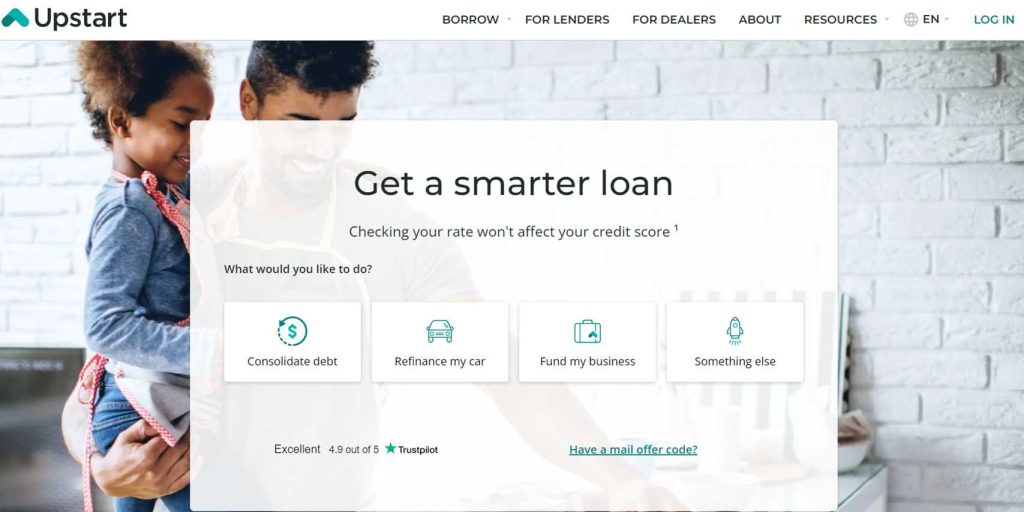
This company is ideal for people with no previous credit history. Upstart’s underwriting process takes education, occupation, and many other factors into account when deciding whether to approve a loan. Therefore, those with a college degree and a track record of stable employment may be at an advantage. However, the only condition for personal income is earning $12,000 a year. Upstart provides credit to individuals without requiring a minimum amount of time in business or annual revenue from the company, improves personal credit, and considers candidates who have no credit.
Pros
- There is no time-in-business or revenue requirement
- Builds individual credit
- They approve candidates with no credit history
Cons
- The origination charge is deducted from the loan amount.
BlueVine
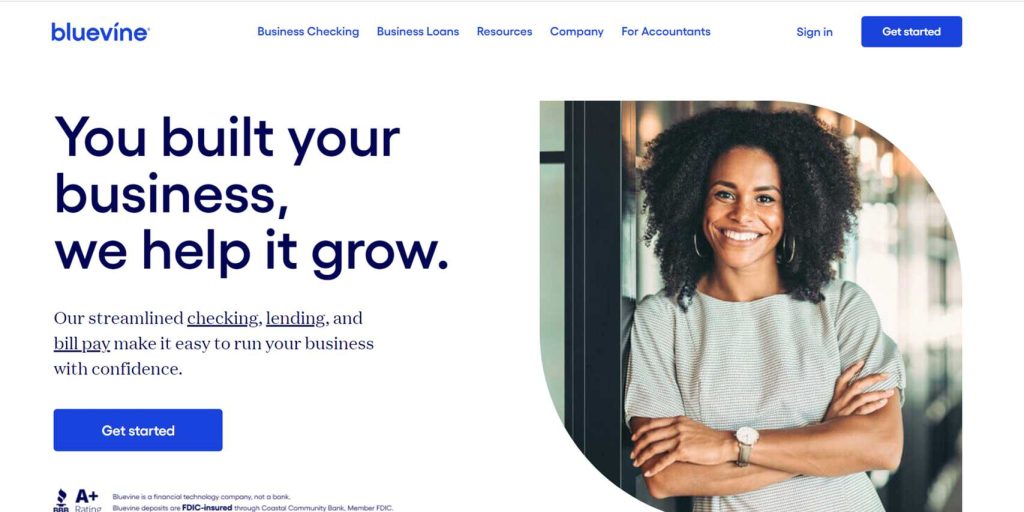
BlueVine is a lending company that provides small businesses with various financial products and services, including credit lines, business checking, and a bill pay service. One of its main products is a line of credit (LOC) that provides businesses with flexible, short-term financing. These credit lines can be as high as $250,000 and are designed to be used as needed, allowing enterprises to withdraw funds and then pay them back over time.
In qualifying for a BlueVine line of credit, businesses typically need a credit score of at least 600 and have been in operation for at least six months. While this may not be as stringent as some other credit products, it may not be accessible to all startups or businesses with poor credit.
However, BlueVineless is challenging to qualify for compared to lines of credit offered by banks or other online lenders, which may have higher credit score requirements. In addition to credit lines, BlueVine provides businesses with business checking accounts and a bill payment tool that enables firms to pay their creditors with a credit card.
Pros
- Access to funds on demand
- Same-day funding is available
- B2B and B2C companies are served
Cons
- Does not accept credit scores lower than 600.
Kiva
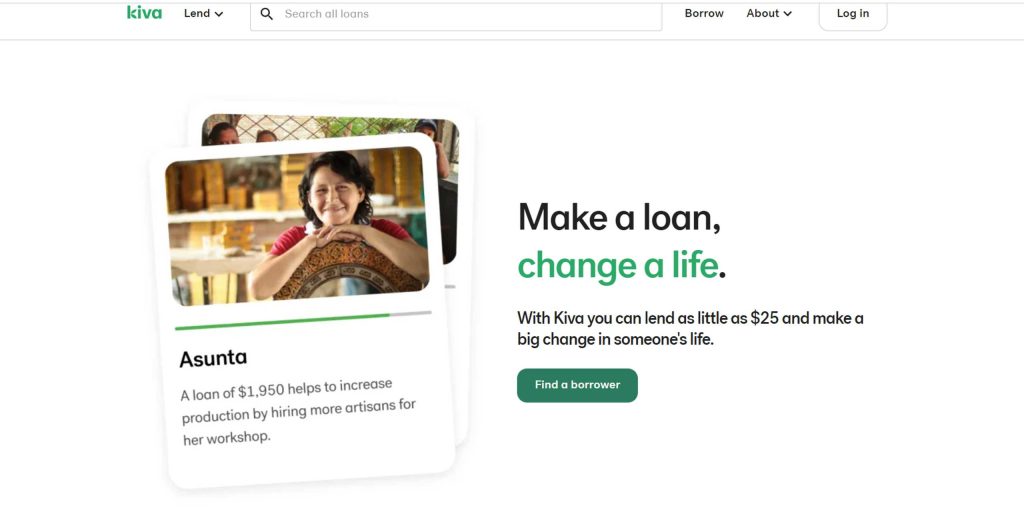
A nonprofit organization called Kiva U.S. is committed to providing small companies in need with loans at no charge. Kiva provides modest, crowdsourced loans to company owners throughout the globe, while Kiva U.S. is particularly for US-based companies. One or more individual lenders back these loans for as little as $25 each. Some advantages of Kiva include the absence of a credit check and the lack of requirements for company experience or income to be eligible. You may repay with a flexible, affordable payback plan without fees or interest charges.
But that doesn’t imply that everyone can use the service. Since you need to persuade site visitors to contribute to your company rather than another, Kiva prefers community-oriented enterprises with an engaging stories. According to Kiva, the ideal client is socially conscious and has a significant internet and social media presence. It’s probably a good idea to visit Kiva’s website to learn more about the many business models supported by the Kiva platform.
Pros
- There is no credit check.
- There is no interest or fees.
- Plans for flexible repayment
Cons
- Startup financing is limited to $1,000.
Fora Financial
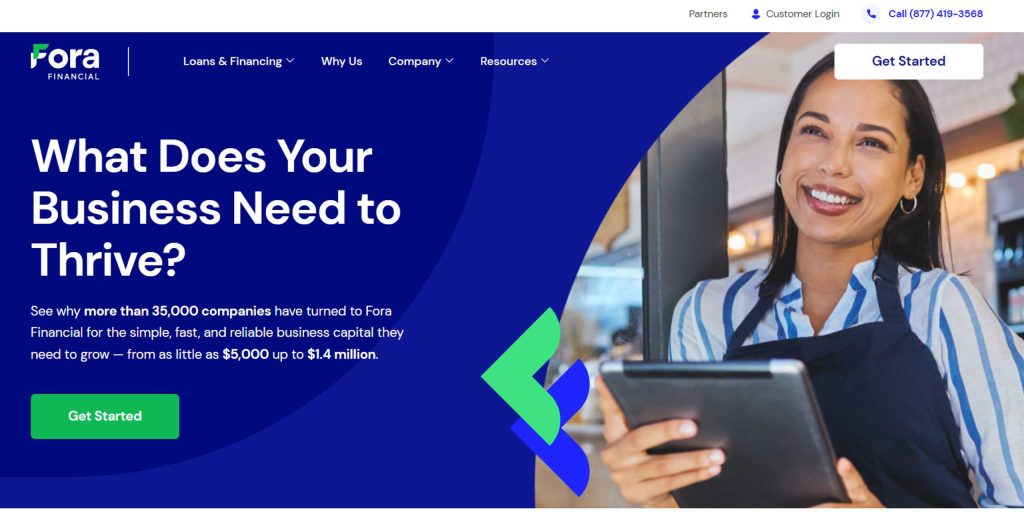
Online lender Fora Financial offers term loans and merchant cash advances (MCAs) for short-term business financing. Fora Financial provides solutions for companies with erratic cash flow or who want short-term funding, but those seeking longer loan terms could do better to check into other small business loans.
The most significant business owners for Fora Financial are those who can: Afford short payback terms. Term loans from Fora Financial have substantially faster repayment terms than typical company loans, with a maximum of 15 months. They are experiencing erratic sales, so they take a percentage of your sales instead of a fixed monthly payment, which may make it easier for businesses with sales that change from month to month to meet payment requirements.
Short-term business loans: These loans can assist companies in increasing their cash flow and swiftly paying off the outstanding sum. Depending on the lender, terms might vary, although they are often less than two years.
Loan sums up to $750,000 are available from Fora Financial for short-term small business loans for up to 15 months. Businesses that can pay off the loan early could get a 10-cent rebate on every dollar borrowed.
Pros
- Adaptable qualification criteria
- There are early repayment reductions available.
Cons
- There are just two sorts of loans available.
- The repayment period is shorter than a year.
The Small Business Administration
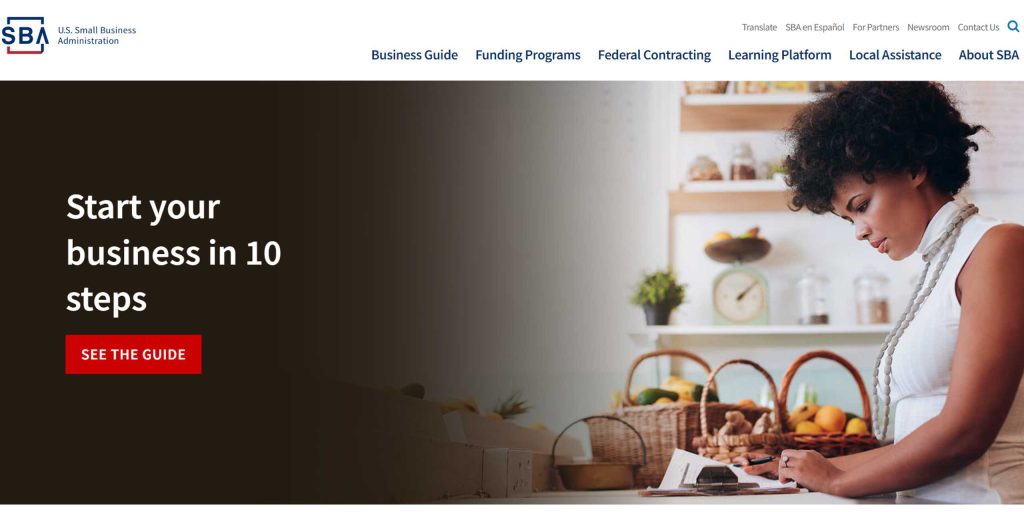
The Small Business Administration (SBA) offers financial support to small businesses through various programs, such as the Microloan Program. This program provides small, short-term loans to small businesses and nonprofit organizations that may not qualify for traditional bank loans.
The average microloan amount is around $50,000, but this can vary depending on the lender and the borrower’s needs. The interest rate on SBA microloans is typically approximately 6.5%, and the repayment terms can be up to six years. One of the significant advantages of these microloans is that they allow small businesses and nonprofits to access financing that may not be available through traditional lending channels. This can be especially helpful for startups, companies with poor credit, and companies operating in disadvantaged areas.
Pros
- Businesses that are typically denied regular loans may be eligible
- Interest rate caps
- Small and large loan sums are available
Cons
- Collateral may be required
- Personal accountability if the company fails
OnDeck
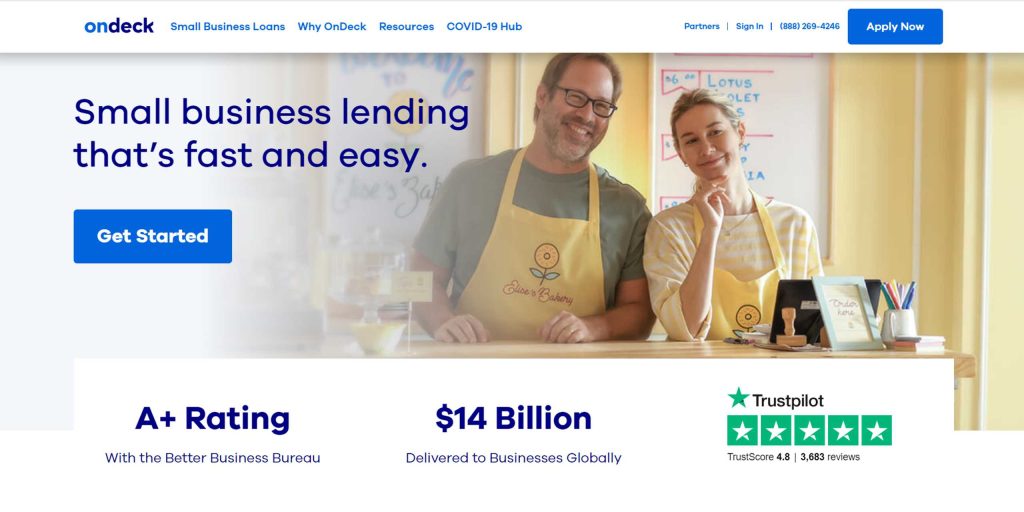
OnDeck, a publicly traded small company lender that operates online and over the phone, was established in 2006. This is the most outstanding small business lender overall for people with bad credit because you only need a credit score of 625 to be eligible for a loan, which is lower than what many lenders offer. Additionally, you can get your money the same day after your loan is approved and get more after you’ve paid half of it.
Borrowing amounts range from $5,000 to $250,000, and credit lines range from $6,000 to $100,000. The income of your company determines the amount that can be borrowed. Up to 24 months are allotted for term loan repayment, whereas a line of credit loan has a 12-month repayment period. When you have paid back half of a term loan, you can apply for more funds without paying any additional interest. Contrary to most lenders, OnDeck automatically makes repayments daily or weekly, depending on the company data you give.
Pros
- In some states, loans under $100,000 can be funded quickly
- Small loan amounts starting at $5,000 are available
Cons
- Fees for term loans and credit lines
Tips for Applying for a Bad Credit Business Loan
The application process for these startup loans for people with bad credit is quick, straightforward, and entirely online. However, these loans are not guaranteed for individuals with poor credit. Consider the following tips to increase your chances of getting a loan for a new business, even with bad credit or no income:
Do not waste time asking for startup loans for which you do not have minimum requirements. When you take out loans for which you have the minimum requirements, apply for several loans and then compare the offers to find the best one (getting pre-approved is safe because it usually only involves a credit check).
If you investigate loan and credit card choices and are unhappy with the offers you receive, you may want to take measures to increase your credit score.
Conclusion
In conclusion, various funding solutions are available to small enterprises with poor credit. Credit cards, microloans, crowdfunding, peer-to-peer lending, and small business loans are included. It is essential to conduct thorough research and comparisons for the top small business loans for startups with bad credit because acquiring financing with poor credit may force you to pay higher interest rates and fees, so it’s essential to thoroughly analyze the terms of any loan or financing you’re contemplating.







